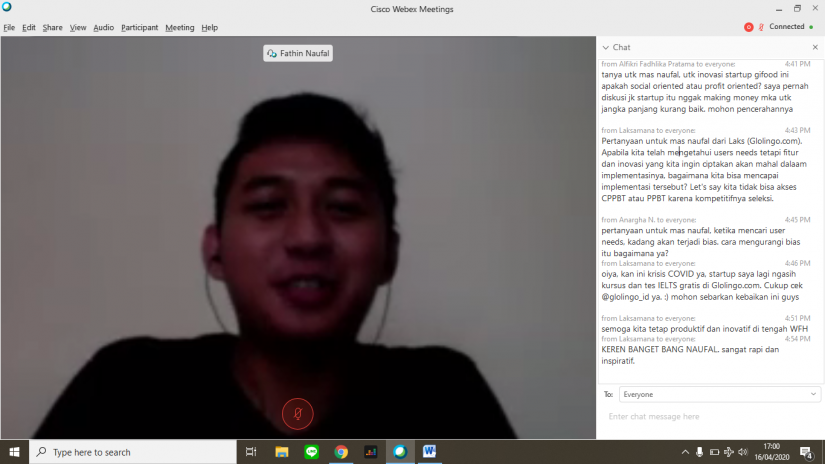
Yogyakarta, April 16th, 2020— Sharing session conducted by Creative Hub (C-Hub) Faculty of Social and Political Sciences UGM (Fisipol UGM) took place with the headline “Digital Activism in the Emergency Response of COVID-19” which held on last Thursday afternoon online. Inviting Suparlan as the Coordinator of the Disaster Sector SHEEP Indonesia Foundation (Yayasan SHEEP Indonesia/YSI) and Fathin Naufal as the founder of Gifood, C-Hub discussed all sorts of digital activism that can be done to help each other in the pandemic.
The SHEEP Indonesia Foundation or the abbreviation of Society for Health, Education, Environment and Peace is a non-governmental organization who has the mandate to carry out community empowerment in the fields of Health, Education, Environmental Sustainability and Peace. According to Suparlan, what distinguishes COVID-19 from other disasters is its non-natural nature. In dealing with this disaster, the protocols used are the health protocol and the crisis risk protocol. “Currently, we are in a crisis management phase, due to the lack of protection of vulnerable communities, there are no government-driven protocols and no agreed upon. Therefore, there are many different actions in each region, for example, those who spray disinfectants, but there are also just data collections,” said Parlan.
Parlan added, based on Law No. 24 of 2007 (UU no. 24 Tahun 2007) regarding emergency response, there are six steps that need to be taken in disaster response or emergency response phase, particularly evacuation of victims, treatment of injured victims (in this case are both People in Surveillance and Patients in Monitoring, provision of food for people in need, preparation of shelters as the quarantine, health services and clean water supply and sanitation.
Within the condition of emergency response, SHEEP tried to answer the problem by conducting health socialization through a short film along with COVID-19 prevention posters with various regional languages. The education also cooperates through supporting system leaders who play an active role in the villages.
Furthermore, Fathin Naufal Nur Islam as the founder of Gifood explained that digital innovation is the correct solution when it comes to physical distancing, but it needs precise analysis so that the innovation created is under the wishes of the community. “We require user’s needs to fully understand customer desires, we often use assumptions when that is not necessarily needed, we must return to the consumer or user-centred,” said Naufal.
In Indonesia, social innovation has great potential. Considering through the Indonesians generosity index that ranks first in the world based on the research of Charities Aid Foundation (CAF) as reported by The Jakarta Post in 2018, this potential is widely opening the opportunities for broad social enterprises collaboration.
Naufal along with Gifood took the opportunity to become a solution to the problem of food waste in Indonesia, which ranks second all over the world. Gifood connects those who have excess food with those who need it. “So far, the problem of the community is not due to the lack of food, but minimal access to those who have excess food,” added Naufal.
From side to side, he and his team are constantly developing their business, which recently collaborated with the DKI Jakarta Baznas Bazis (the official zakat administrator of DKI Jakarta) with the program of “Bagiipiring”. Involving eighty more food stalls such as warteg and MSMEs, the Bagiipiring program helped the elderly and disabled people in the COVID-19 pandemic to meet their daily needs. “There are many simple things we can do for good and don’t forget to collaborate. The key is understanding, innovation and collaboration,” concluded Naufal to end the discussion.
